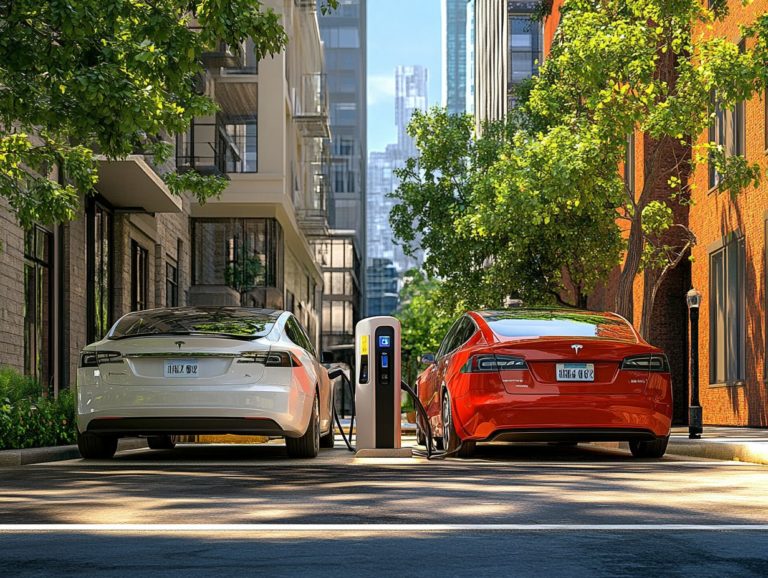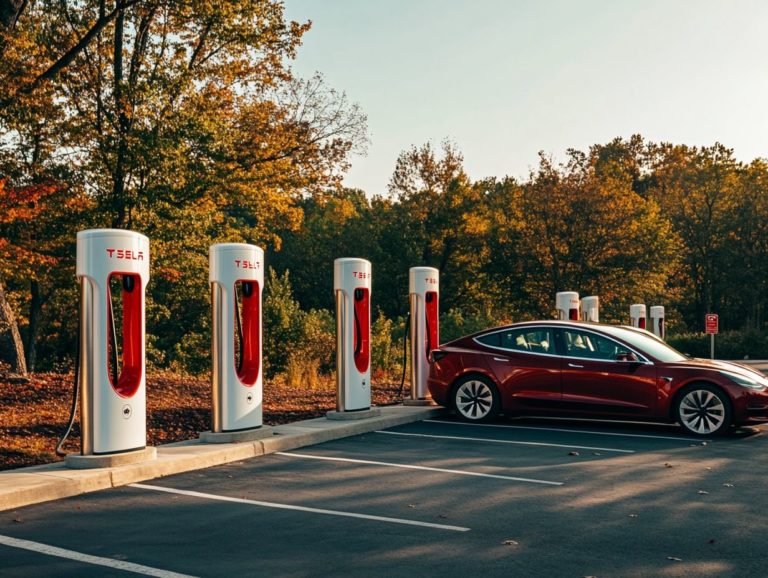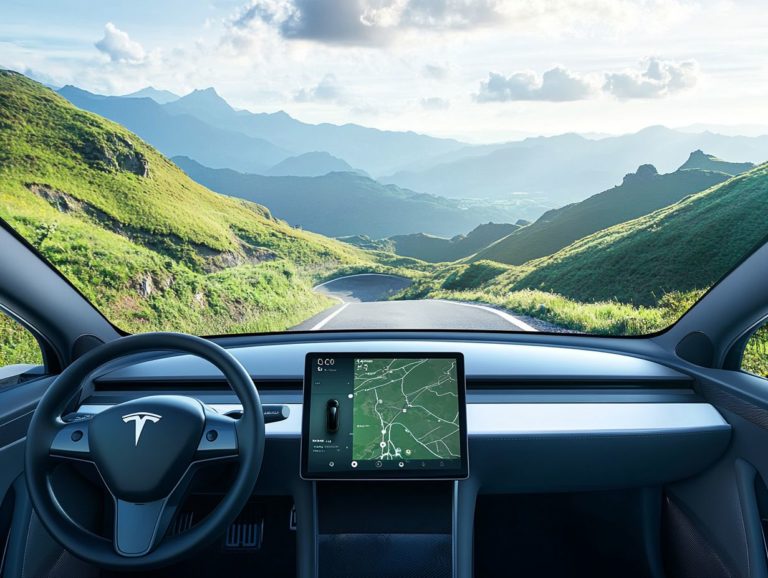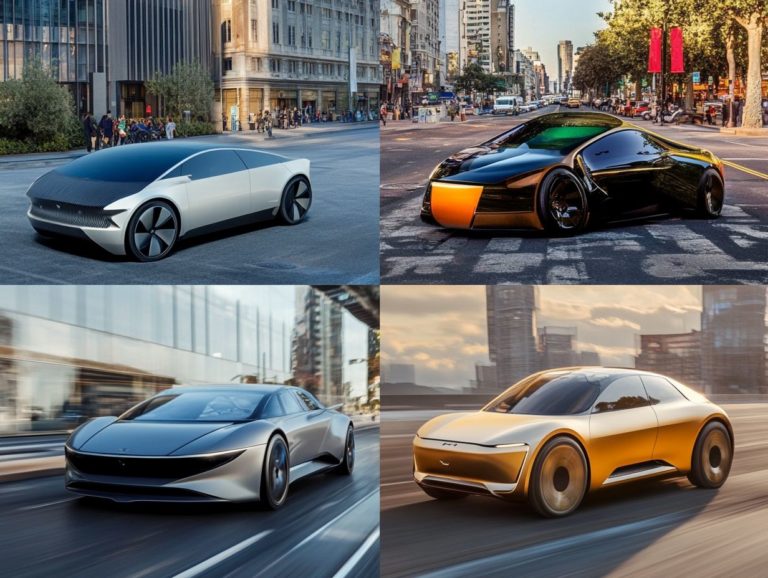9. comparing all-electric vs. hybrid vehicles
As the automotive industry transforms, electric and hybrid vehicles are transforming the future of driving! They are emerging as the frontrunners in the pursuit of sustainable transportation.
This article delves into the essential differences between all-electric and hybrid models, examining their technology, performance, and environmental impact.
It provides a comprehensive breakdown of cost considerations, charging options, and the overall driving experience of each type. This empowers you to determine which vehicle suits you best.
Whether you re contemplating a shift to greener options or simply seeking knowledge, this guide will illuminate your path forward. Are you ready to join the movement towards sustainable driving?
Contents
- Key Takeaways:
- Comparison of All-Electric and Hybrid Vehicles
- Environmental Impact of Electric and Hybrid Vehicles
- Cost Considerations
- Range and Charging Options
- Driving Experience
- Frequently Asked Questions
- What is the main difference between all-electric and hybrid vehicles?
- Which type of vehicle is more environmentally friendly?
- Are all-electric vehicles more expensive than hybrid vehicles?
- Do all-electric vehicles have a longer range than hybrid vehicles?
- Are there any tax incentives for purchasing an all-electric or hybrid vehicle?
- Can I charge an all-electric vehicle at home?
Key Takeaways:
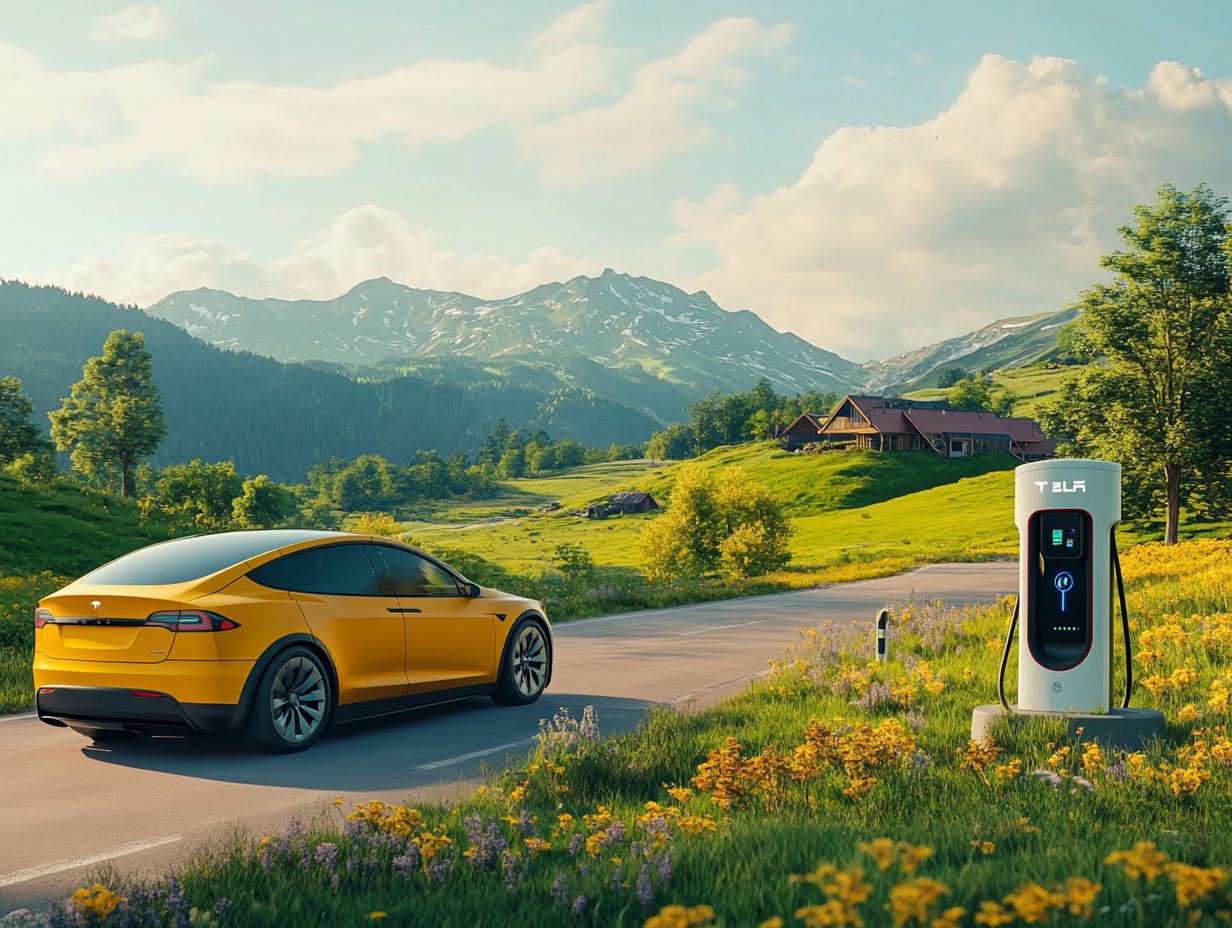
- All-electric vehicles produce zero emissions.
- Hybrids still emit some greenhouse gases.
- All-electrics usually have lower running costs but higher upfront costs.
- The driving experience of all-electric vehicles is smoother and quieter.
- Hybrid vehicles offer better range and quicker acceleration.
What are Electric and Hybrid Vehicles?
Electric and hybrid vehicles are revolutionizing the automotive landscape, championing cleaner air and sustainability. As you explore your options, you ll find that electric cars, including battery electric vehicles (BEVs) and plug-in hybrid electric vehicles (PHEVs), are gaining popularity thanks to their innovative technologies like electric motors and advanced batteries.
Leading models such as the Tesla lineup, Chevrolet Bolt, Toyota Prius Prime, and Kia Niro Hybrid offer compelling alternatives to traditional gasoline engines. They tackle common concerns like range anxiety while helping you save on fuel costs over time.
Equipped with a system that recovers energy when you slow down and sophisticated energy management software, these vehicles enhance efficiency while minimizing fuel consumption. If you re considering hybrid options, you ll appreciate their ability to work seamlessly with existing infrastructure, often achieving impressive fuel economy ratings that can significantly lower your operational costs.
As the market evolves, manufacturers are doubling down on research and development efforts, making impressive advancements in battery life and charging times. With urban areas tightening emissions regulations, you can expect the adoption of electric and hybrid technologies to rise, reshaping the way we think about transportation and our responsibility to the environment.
Comparison of All-Electric and Hybrid Vehicles
When you compare all-electric vehicles with hybrids, it’s vital to grasp their unique advantages and limitations regarding technology, performance, and ownership costs and environmental impact.
Electric vehicles (EVs) provide the remarkable benefit of zero-emission driving, making them an eco-friendly choice. Hybrids cleverly merge a gasoline engine with an electric motor, resulting in enhanced fuel economy and lower fuel expenses.
Understanding these distinctions will enable you to make an informed decision that aligns with your preferences and values.
Key Differences in Technology and Performance
The key differences between battery electric vehicles (BEVs) and plug-in hybrids (PHEVs) are found in their powertrains and how they drive. BEVs rely exclusively on electric motors and batteries for propulsion. In contrast, PHEVs combine a gasoline engine with an electric motor, offering greater flexibility and efficiency on the road.
PHEVs often provide superior overall range, with many models boasting an impressive driving range of 400 miles or more when using both electric and gasoline power. BEVs typically present driving ranges that can vary widely, generally falling between 200 to 350 miles on a single charge. This variation is influenced by factors like battery capacity and the vehicle’s weight.
Regarding performance metrics, BEVs shine with their instant torque delivery, allowing for quicker takeoff times. PHEVs might experience a slight delay due to the complexities of their combined powertrains. Efficiency is another area where BEVs tend to outshine PHEVs, making them particularly appealing to environmentally conscious drivers eager to minimize their carbon footprint.
All these performance characteristics and technical nuances shape your ownership experience, impacting everything from fuel savings to maintenance requirements.
Environmental Impact of Electric and Hybrid Vehicles
The environmental impact of electric and hybrid vehicles is significant. They play a crucial role in reducing carbon footprints and addressing climate change.
By emitting fewer pollutants compared to traditional gasoline vehicles, electric and hybrid technologies support cleaner air initiatives and advance sustainable transportation solutions.
Reducing Carbon Footprint and Pollution
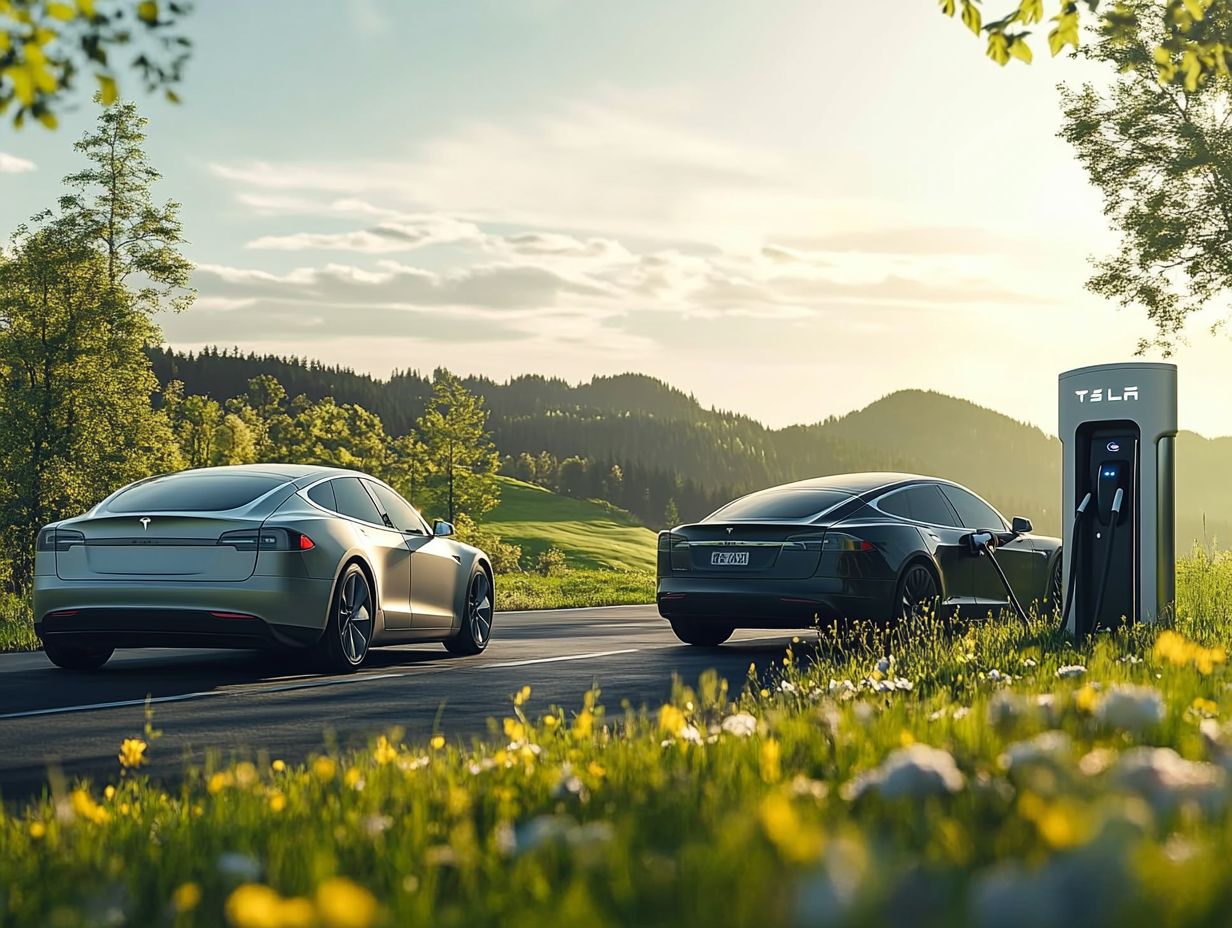
One primary advantage of electric cars and hybrid vehicles is their ability to reduce your carbon footprint and pollution. By harnessing renewable energy sources and cutting-edge battery technologies, these vehicles significantly decrease harmful gases, aligning perfectly with global efforts for cleaner air and sustainability.
Studies reveal that electric vehicles produce up to 60% fewer greenhouse gases over their lifetime compared to traditional gas-powered cars. Programs like the EV tax credit provide attractive incentives for making the switch, effectively lowering the upfront costs of these eco-friendly choices.
Cities that implement electric vehicle initiatives witness marked improvements in air quality. This translates to better health outcomes for their residents. With the expansion of charging infrastructure and robust government support, the rise in electric and hybrid vehicle adoption plays a vital role in creating sustainable urban environments while actively combating climate change.
Cost Considerations
Cost considerations greatly influence your decision-making process as a potential electric or hybrid vehicle owner. It s important to think about the upfront costs, ongoing maintenance expenses, and long-term savings on fuel.
While the initial investment might be steeper, various incentives and rebates like the EV tax credit can greatly alleviate financial burdens.
Upfront and Maintenance Costs
When evaluating electric vehicles against traditional gasoline engines and hybrid models, upfront and maintenance costs are crucial.
The initial purchase price of electric vehicles is often higher, but the long-term savings from lower maintenance costs and fewer moving parts are appealing. For example, with electric vehicles, you typically won t need to worry about oil changes. Their braking systems often have a longer lifespan thanks to regenerative braking technology.
Traditional gasoline engines come with ongoing expenses like oil changes, transmission fluid replacements, and timing belt repairs, which can add up over time.
Considering the average distance that commuter cars travel, the reduced fueling costs associated with electric vehicles can lead to notable financial advantages.
Hybrid models strike a balance, providing some maintenance savings while still requiring conventional vehicle upkeep. This illustrates the diverse financial implications within this market.
Range and Charging Options
When contemplating the acquisition of a battery electric vehicle (BEV) or a plug-in hybrid, range and charging options significantly influence your daily experience and convenience.
Understanding range anxiety the fear of running out of battery power is crucial. However, it’s becoming increasingly manageable with the expanding network of charging stations and advancements in charging infrastructure.
How Far Can You Go and How to Recharge?
Knowing how far you can go in electric cars and plug-in hybrids, as well as how to recharge them, is essential for any prospective buyer.
Many electric vehicles now boast ranges that comfortably accommodate both daily commutes and longer road trips due to rapid advancements in charging infrastructure.
For instance, numerous modern all-electric models can achieve impressive ranges of over 300 miles on a single charge. Plug-in hybrids cleverly combine electric power with a gasoline engine, often extending their range to exceed 500 miles when both systems work in harmony.
Charging options abound, from home chargers to public charging stations and fast chargers. Each varies in speed and convenience. By effectively planning your charging stops during long journeys and using apps that pinpoint nearby charging locations, you can easily alleviate worries about running out of power. This helps turn range anxiety into a relic of the past.
Driving Experience
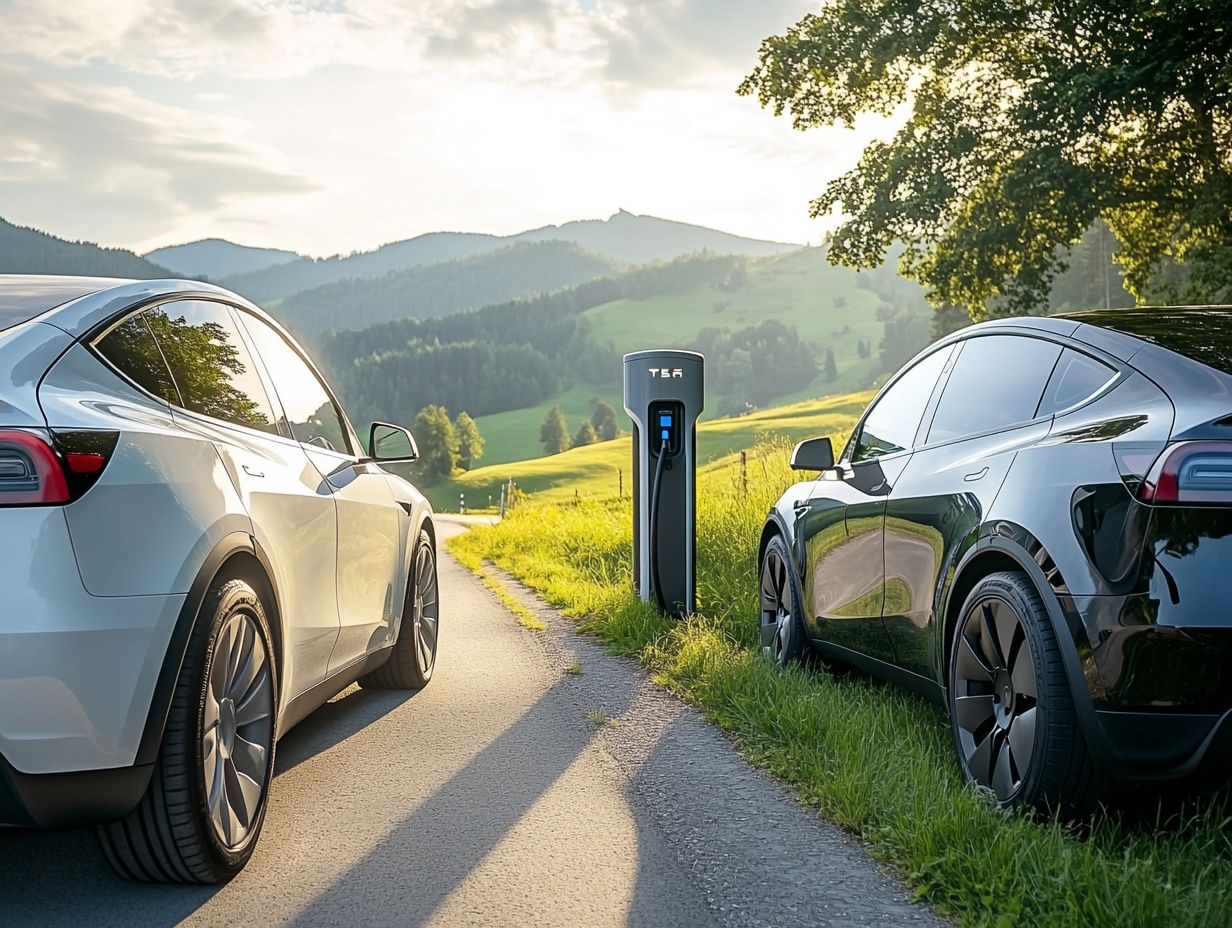
The driving experience of electric and hybrid vehicles stands apart from traditional gasoline-powered cars. These vehicles present unique advantages in handling and acceleration.
Thanks to the instant torque delivered by electric motors, you may find that these vehicles provide a remarkably smooth and responsive ride, making your drive more enjoyable.
Handling and Acceleration
Handling and acceleration in electric and hybrid vehicles are celebrated for their responsiveness and agility. This is due to the powerful electric motor that delivers immediate torque.
This capability results in impressive acceleration that can rival traditional gasoline engines while offering you a distinct and exhilarating driving experience.
Take the Tesla Model 3, for instance. It showcases nimble handling, allowing you to glide through sharp corners effortlessly. Its low center of gravity enhances stability during high-speed maneuvers.
Hybrids like the Toyota Prius deliver a seamless blend of gasoline and electric power. This unique combination creates smooth transitions that provide a balanced feel on the road.
Many of these vehicles also come equipped with advanced traction control systems and regenerative braking, which captures energy usually lost during braking and uses it to recharge the vehicle’s battery. These features elevate their driving dynamics well beyond those of conventional vehicles.
Which is the Better Option for You?
Choosing between hybrid vehicles and electric cars hinges on your individual preferences, driving habits, and specific needs, including cost considerations and range concerns. Both options have their advantages, making it crucial for you to weigh the benefits of each before deciding.
For example, hybrid vehicles offer a smooth transition between gasoline and electric power, allowing you the convenience of extended range without the hassle of frequent charging stops.
In contrast, electric cars provide a quieter, smoother driving experience, often accompanied by lower maintenance costs and enticing government incentives.
Regarding environmental impact, electric cars take the lead with zero tailpipe emissions, significantly reducing their carbon footprint compared to even the most fuel-efficient hybrids. Take a moment to think about your lifestyle! This choice can transform your driving experience.
Ultimately, it s essential to reflect on your driving patterns and financial situation to determine which option aligns best with your vision of sustainable transportation. Don t miss out on the benefits of going electric!
Frequently Asked Questions
What is the main difference between all-electric and hybrid vehicles?
The main difference is their source of power. All-electric vehicles run solely on electric batteries, while hybrid vehicles use a combination of electric batteries and a traditional gasoline engine.
Which type of vehicle is more environmentally friendly?
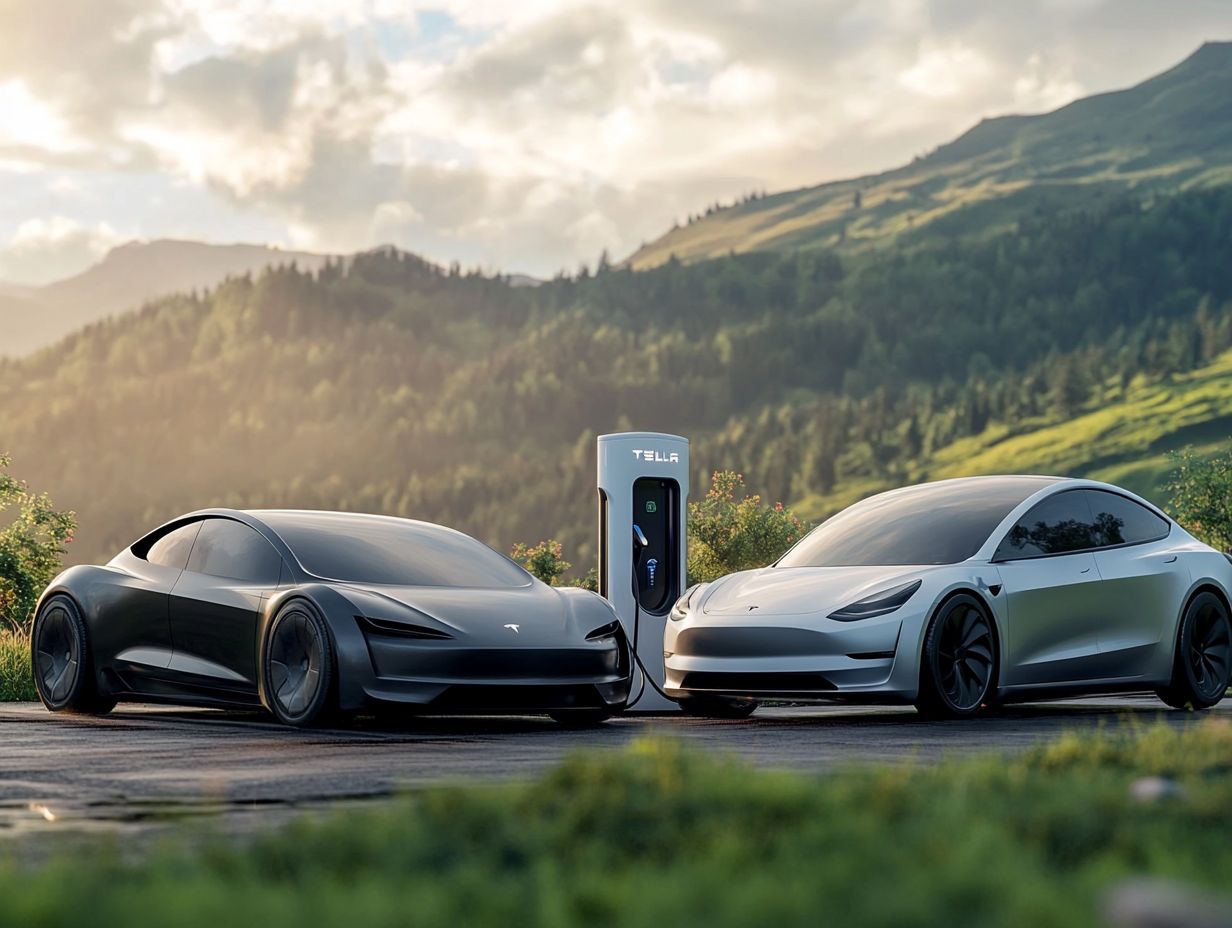
All-electric vehicles are more environmentally friendly because they produce zero emissions. Hybrid vehicles still produce some emissions from their gasoline engines.
Are all-electric vehicles more expensive than hybrid vehicles?
Yes, all-electric vehicles are generally more expensive than their hybrid counterparts because the technology used in electric vehicles is still relatively new.
Do all-electric vehicles have a longer range than hybrid vehicles?
It depends on the specific models being compared. Generally, all-electric vehicles have a shorter range than hybrid vehicles, but some newer all-electric models have a longer range thanks to advancements in battery technology.
Are there any tax incentives for purchasing an all-electric or hybrid vehicle?
Yes, there are tax incentives available for both all-electric and hybrid vehicles. However, the incentive amount may vary depending on your location and the specific vehicle you choose.
Can I charge an all-electric vehicle at home?
Yes, you can charge most all-electric vehicles at home using a standard outlet. However, it is recommended to install a Level 2 charging station for faster and more efficient charging.


